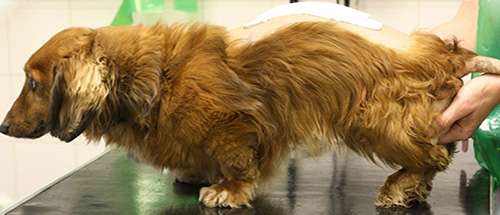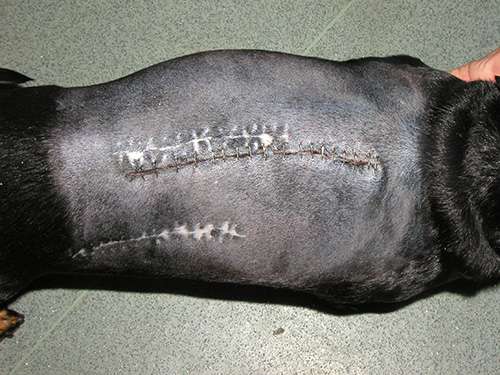Longer 'sausage dogs' are at risk of slipped discs

Long-and-low dwarf breeds are prone to painful and debilitating slipped discs, and a new study from The Royal Veterinary College published on 24th July 2013 in the journal PLoS ONE, reveals that dogs with longer backs relative to their legs are in more danger of this happening. This means that breeding dogs to be longer in the body and shorter in the leg is putting them at risk.
The study reveals that very long Miniature Dachshunds, whose backs are two-thirds longer than their shoulder height, have double the risk of slipping a disc by the time they reach five years old, compared with the shortest individuals of the same breed.
The researchers examined 700 dogs of diverse breeds referred to the Royal Veterinary College's Queen Mother Hospital for Animals over the course of a year, of which 79 dogs suffered the relevant type of slipped disc. Most of the affected dogs had long and low body shapes, although Jack Russell Terriers and Cocker Spaniels were also affected for reasons yet to be understood. Having a longer and lower body shape was the biggest risk factor, but small body size and being overweight also made dogs more vulnerable to the condition. Being obese approximately tripled the chance of these slipped discs happening - in breeds with very low risks, that chance remained low, but in high risk breeds the effect could be dramatic.
Dwarf breeds (such as Dachshunds and Basset Hounds) have been bred to have 'long and low' body shapes, partly driven by the formal descriptions of each breed's characteristics, known as 'Breed Standards'. Researchers at The Royal Veterinary College investigated whether certain body proportions, described in some Breed Standards, predispose dogs to the type of slipped disc associated with dwarfism.

Dwarf dog breeds have abnormal cartilage, making them prone to a certain type of slipped disc. In these dogs the normal shock absorbing gel, which is encased in 'discs' between the bones of the spine, degenerates and hardens. A disc can then rupture and the hardened material bursts out, pressing painfully on the spinal cord and causing nerve damage.
Rowena Packer from the Royal Veterinary College, who carried out the study, said: "We regularly see some of the longest dogs come into the hospital for their first, second or even third slipped disc. Unfortunately this disorder is so common in some of the longest breeds, that it could almost be regarded as 'normal', however breeders and vets should not become desensitised to this serious condition, and must work together to reduce its occurrence as it causes huge distress for both the dog and owner."
When slipped discs happen, they are usually sudden, with the dogs in obvious pain and sometimes unable to move their hind legs. Many of these dogs must be cared for as long term paraplegics with some relying on wheels to support them as they move around. Some dogs must undergo major spinal surgery followed by a lengthy stay in a cage while they heal. Other dogs are so severely affected that a grave decision has to be made to put them down.
Dr Charlotte Burn, who led the research, said: "The 'sausage dog' shape is highly distinctive of these breeds, but these results show that our demand for longer and lower dogs needs to be reined in. In this context, shorter backs are safer backs."
"We were also surprised that smaller dogs were at more risk, but this is likely because the human environment is larger relative to their body size, making things like jumping down a step, or into a car, more dangerous for them."
Veterinarians Dr Anke Hendricks and Dr Holger Volk, both from The Royal Veterinary College, emphasised the importance of keeping your dog lean and in good body condition. "Breeders, veterinarians and researchers need to work together to use the findings of this study to improve the body shape of those lovely dogs to reduce the risk of this serious condition. Embracing the results with an open mind to improve the wellbeing of human's best friend is of vital importance."
Dr James Kirkwood, Scientific Director of the Universities Federation for Animal Welfare said: 'This important research clearly illustrates the potential dangers to animal welfare associated with breeding dogs for body shape or other characteristics to meet arbitrary preferences about appearance rather than for good health, welfare and fitness. It shows the way for making great and long-lasting improvements to the welfare of these dogs.'
More information: PLoS ONE 8(7): e69650. doi:10.1371/journal.pone.0069650.
Journal information: PLoS ONE
Provided by Royal Veterinary College

















